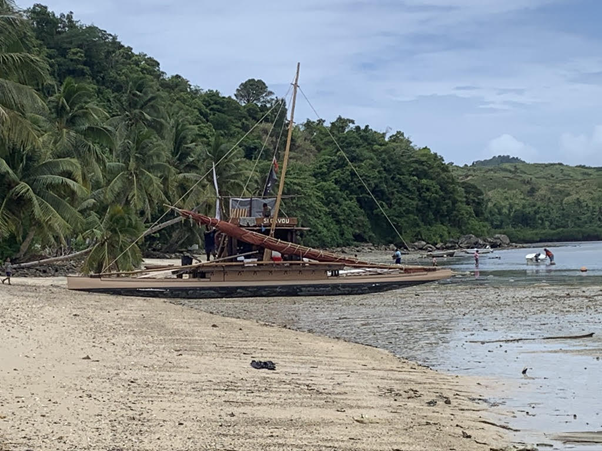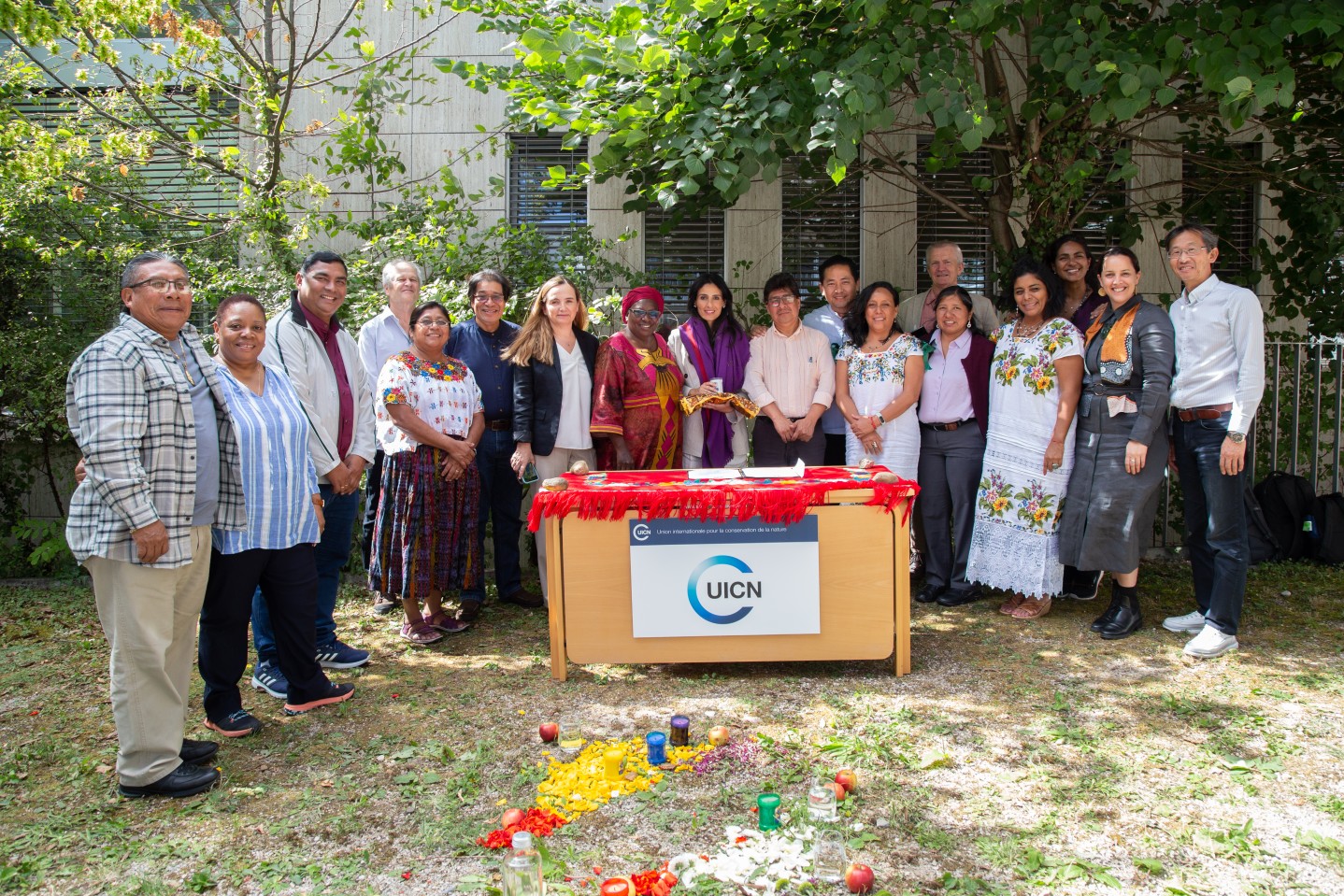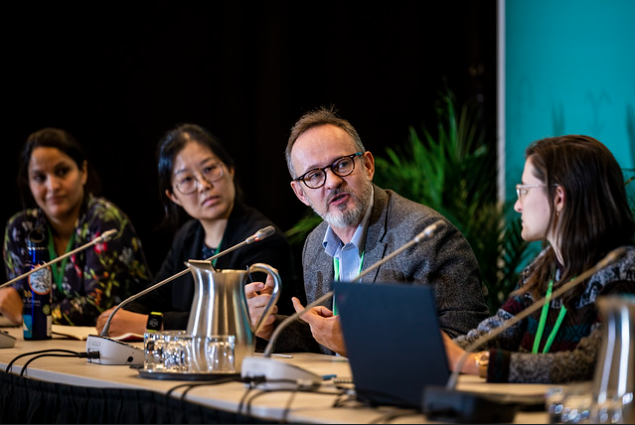Moving culture across ocean policy
CEESP News: Elise Huffera
Culture is a fundamental feature of oceanic living in the Pacific Islands. This is repeated in official documents and speeches and is understood intrinsically by communities across the vast liquid continent. When it comes to policy though, the deep connections between humans and the ocean are generally passed over, with preference given to western science and management tools. A shift, offering new directions, is nonetheless taking place.

I Vola Sigavou, Daliconi Village, Lau, Fiji
The Pacific Ocean is an intimately cultural space: place and family names shared across countries, and communities is just one indicator of the multiple kinship connections between humans and the ocean. Yet ocean policy, whether at the international or regional levels has generally been weak when it comes to understanding and promoting the value of these important and deep seated linkages in past, present and future stewardship. There has nonetheless been a shift in acknowledging the value of Indigenous and local knowledge (ILK) and/or traditional knowledge (TK) as a natural resource management tool including for the deep ocean as demonstrated by the inclusion of TK in draft treaty on the conservation and sustainable use of marine biological diversity of areas beyond national jurisdiction, commonly known as BBNJ. The UN Decade of Ocean Science for Sustainability Development 2021-2030 is also paying increasing, albeit timid, attention to ILK and TK. However, ILK and TK practices are part of larger and deeper cultural complexes linking land, sea and sky, and the living and ancestors, which need to be better understood and made more accessible to policy circles without violating their integrity.
The transmission of cultural knowledge, norms and world views has traditionally occurred orally or through cultural expressions such as genealogies, chants, dances, body ornamentation which are often encoded and are ignored by modern scientific approaches. There are, however, Pacific and associated scholars who have been publishing work that focuses on cultural approaches to the ocean and marine creatures and provide ways of looking at conservation policy in the region that draw on the rich Pacific heritage.1 Others are involved in drawing out navigational or voyaging traditions which provide ethical and decolonising frames.2 There is also an archive of older work which authors like D’Arcy3 and Genz,4 have made use of to recount cultural relationships of Pacific communities with the ocean. Genz, for instance, retells foundational stories told to him by Marshallese navigators, which provide windows into ocean world views held in the Marshall Islands.
Interest in the cultural dimensions of the ocean is growing. For instance, the upcoming Handbook on of Blue Heritage (published by Palgrave) is the first such volume to focus on cultural dimensions of the ocean and contains a chapter on the Pacific written by multiple authors.5 However, further increasing attention to the cultural dimensions of the ocean is needed to decolonize, indigenize and contextualize ocean policy. A project that the CEESP Oceania Vice-Chair is leading with support from the University of Bergen and the University of the South Pacific aims to establish a network and tools to bring together knowledge holders, researchers, academics and practitioners, and collate existing research and publications that focus on cultural dimensions of the ocean under one ‘umbrella’. It also seeks, in the future, to enable commissioning of new research and story telling by Pacific scholars and practitioners with expertise in ocean cultural connectivity. Already, collaboration with the Pacific Environment Regional Program (SPREP) is underway to foster research on ancestral and cultural human-dolphin relations in the Solomon Islands as part of the need to better understand dolphin hunting practices and to supplement ‘modern’ scientific research. This initiative is bringing together both scientists and cultural experts.
An associated activity is a 25 PhD scholarship awards program on the ocean-climate nexus established between the University of Bergen and the University of the South Pacific which includes a cluster on Pacific Cultural Heritage. It is hoped that potential students from 15 different eligible Pacific Island countries will take up this opportunity to contribute to ocean culture knowledge. Another initiative which is currently being envisaged includes developing a story-telling program on ocean care and kinship. A possible collaboration between CEESP Oceania and partners within the Ocean Rights and Kinship network is being explored.
The Fifth International Marine Protected Area Congress (IMPAC5) (taking place in February 2023), will also be an opportunity to bring culture, ILK and TK to the fore in marine conservation approaches. CEESP Oceania is coordinating a session entitled: We Are the Ocean: Transforming Ocean Conservation which will “connect ocean, culture and human well-being” and bring together, inter alia, speakers from Tahiti, Aotearoa New Zealand, Vanuatu and the Federated States of Micronesia.
aAdjunct Associate Professor at the Oceania Centre for Arts, Culture and Pacific Studies at the University of the South Pacific and CEESP Regional Vice Chair of Oceania
1See for instance, Torrente, F., Bambridge, T., Planes, S., Guiart, J., Clua, E. 2018. Sea Swallowers and Land Devourers: Can Shark Lore Facilitate Conservation? Human Ecology (2018) 46:717-726.
2See for instance, Vince Diaz, Why Indigenous Canoes; Indigenous Resurgence and So Much More, Zoom Talk, Belmont Public Library, MA, May 3.
3See D’Arcy, P., 2008. The People of the Sea: Environment, Identity and History in Oceania, University of Hawai’i Press, Honolulu.
4See Genz, J. H., 2018. Breaking the Shell: Voyaging from Nuclear Refugees to People of the Sea in Marshall Islands, University of Hawai’i Press, Honolulu.
5See Hills, J., Chand, K., George, M., Huffer, E., Kruger, J., Samuwai, J., Soapi, K., Smith, A. 2022. Blue Heritage in the Blue Pacific in Boswell, R., O Kane, D., Hills, J. (eds) The Palgrave Handbook on Blue Heritage, pp. 273-302, Palgrave Macmillan, Cham.



